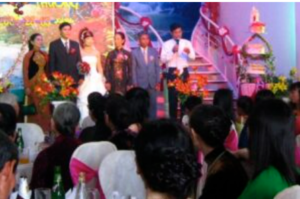Special Occasion Speeches: Definition, Examples, Objectives
No doubt you are looking forward to special events in your life and the lives of those close to you. Be it a wedding, an awards banquet, or another occasion, a few carefully chosen words can help to heighten the significance and emotions of the event.
Definition

While speeches for special occasions are designed to be different from those for school or work, the basic tenets of public speaking still apply. What is very important to keep in mind is that the event is about sharing and celebrating with others. A special occasion speech is meant to lift others up, even in the solemn case of a funeral eulogy. Even if you are the emcee of an event, the focus should not be on you, but rather on the event itself. If you are the winner of an award who is asked to give an acceptance speech, the focus should be on remembering and thanking others who helped you achieve the outcomes that led to the award.
Examples
The following video offers an example of a commemorative speech for a birthday celebration. Even though the speaker talks about his experiences with his father, who is being commemorated, the focus is still on the father.
https://www.youtube.com/watch?v=D7pV2GKW-bU
Here is the video with a transcript: Commemorative Speech Public Speaking edX Series (opens in new window).
This video of a valedictorian’s graduation speech shows how humor can be used to maintain interest while focusing on the occasion.
Here is the video with accurate captions and a transcript: Funniest Graduation Speech of All Time (opens in new window).
The following video lists various types of situations for special occasion speeches, and previews the objectives of special occasion speeches.
Objectives
There is just one main objective in special occasion speaking:
Keep the focus on the person, situation, occasion, or event, and not on you.
To keep the focus on your message, you need to understand the audience and connect with them and their emotions. Traditional journalism questions can help you do that:
-
Who is this speech about, who else is speaking, and who invited me to speak? This will tell you something about who the people are at this occasion and why you’re there.
-
What is the reason for the occasion and what is the goal of my speech? This tells you what kind of tone to take. You can adapt your speech to fit a fun occasion or a sad occasion.
-
When is the occasion and when will I be speaking during the program? The first question lets you know how much time you have to prepare and practice. The second is even more crucial: your time slot during the program will determine how long you have to speak and, in part, the function of your speech. Are you opening or closing the program, or somewhere in the middle? Length is very important. The audience has little patience for a speech that runs past the allotted time. They also don’t want a one-sentence statement.
-
Where is the location of the function? This allows you to prepare how to move and speak to the audience.
-
Why have they chosen me to speak and what can I bring to this speech that is uniquely mine? There is a reason that you were asked to be there and speak. It is important to keep this in mind and use it to your advantage.
-
How do I want this speech to be remembered? Sometimes the best way to find the right tone and content for a speech is to think about the effect you want to have on the audience. How would you want them to remember your speech?
